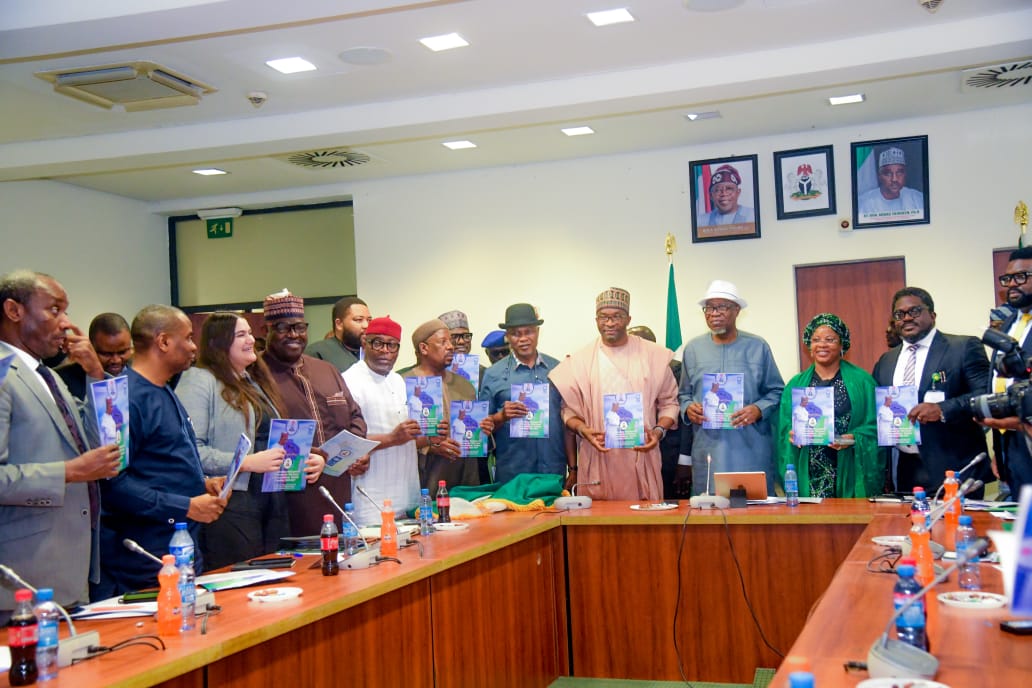The legislative agenda is to be used to meet the yearnings and aspirations of Nigerians, and they would use it as a benchmark to evaluate and assess the performance of the House after four years.

Legislative Agenda has become the common term to describe the four-year plan of policies and actions by the National Assembly.
A Legislative Agenda is a social program of proposed legislations to support policies and programs of government that would help speed up development and reforms that will better the lives of citizens.
The agenda is a document that encapsulates set goals as well as steps and legislative actions to be taken to achieve them, and with which members of the public and the lawmakers themselves assess the performance of an Assembly.
The tradition of setting a Legislative Agenda in the House of Representatives began in the 7th Assembly under former Speaker Aminu Waziri Tambuwal, who came up with some priority issues that the House had to address during its tenure.
READ ALSO: Naira Depreciation: Reduce your cabinet size -Reps to President Tinubu
Following in these footsteps, the 10th House of Representatives shortly after its inauguration in June 2023, unveiled its proposed Legislative Agenda before proceeding on annual recess on Thursday, July 27, 2023.
It was a six-point legislative agenda with a focus on driving progress, prosperity, inclusivity, human capital development, healthcare, transparency, and accountability, as well as the security and safety of Nigerians.
Recall that the House consequently convened a stakeholder meeting to seek input from stakeholders.
At the gathering, Speaker Tajudeen Abbas noted that it was a critical stakeholders’ meeting to harness citizens’ input to the Legislative Agenda of the 10th House.
He said: “Our desire is to have a legislative agenda that meets the yearnings and aspirations of citizens and with which they would use as a benchmark to evaluate and assess our performance after four years. Therefore, today’s meeting should not be seen as the usual talk-shop. Consider it a critical national assignment.”
Abbas also expressed the House’s readiness to welcome citizens’ participation in the efforts towards addressing the challenges facing the country.
READ ALSO: Legislative Agenda: Stakeholders urge Reps to probe N150bn PTF
“Our desire is to have a legislative agenda that meets the yearnings and aspirations of citizens, and with which they would use as a benchmark to evaluate and assess our performance after four years.
“There is no better way to show that the 10th House of Representatives is ready to respond, and urgently too, to the yearnings of those who brought us to the People’s House to do the people’s business,” he noted.
However, four months after its inauguration, and two weeks since it resumed from its annual recess on Tuesday, 26 September 2023, the final draft of the Legislative Agenda is yet to be submitted for adoption.
The Adhoc committee, constituted to put the draft agenda together, following extensive consultations with critical stakeholders, is expected to have turned in its report for consideration and adoption by the House.
Also recall that the chairman of the committee and Leader of the House, Rep. Julius Ihonvbere, had listed the agenda as economic empowerment and diversification, infrastructure development, education and human capital development, healthcare for all, transparent governance, accountability, and security and safety of persons and properties.
Ihonvbere said the agenda, being the vision of the 10th Assembly, would be the fulcrum upon which its legislative operation would be based, adding that one of the House’s foremost goals is to drive the economy, given that Nigeria’s over-reliance on oil exports has left the economy vulnerable to fluctuations in global oil prices.
READ ALSO: Tambuwal loses out as Senators Bamidele, Mwadkwon, Others emerge Senate Principal Officers
According to him, to mitigate this risk and build a sustainable economy, they would incentivise investments in non-oil sectors such as agriculture, technology, and renewable energy.
“In the agriculture sector, we will pass legislation to modernise farming practices, improve access to credit for farmers, support agricultural research and development, explore opportunities in agro-processing to add value to the country’s agricultural produce, and create more jobs.
“We will work with them and with Mr. President to provide all that they require to secure lives and property. No stone will be left unturned in designing and implementing new strategies, in collaboration with communities, stakeholders, and civil society to completely alter the security architecture of the country.
“In the technology and innovation space, we will foster an environment that encourages start-ups, nurtures innovation hubs, and incentivises research and development.”
He equally said the current Assembly would focus on making Nigeria a technology powerhouse, leveraging its young and dynamic population to drive innovation and digital transformation.
“The agenda would prioritise renewable energy projects to reduce the country’s carbon footprint, improve energy security and create jobs in the renewable energy sector.
“Our overall goals are job creation, higher foreign exchange earnings, new skills development, diversification of exports, and strengthening and deepening our technological foundations,” he explained.
Additionally, in another interactive meeting with development partners and technical support organisations in Abuja last month, the Speaker made a commitment to collaborate with OrderPaper and other development partners toward the successful implementation of the Legislative Agenda and an improved National Assembly.
The meeting, according to him, was also to provide an opportunity to share ideas and updates on contributions and support for capacity development for legislators and staff, as has been done in the past.
“Capacity development in the 10th House is very necessary given the high turnover rate of members and aides, as well as the need for enhanced and effective service delivery.”
As promising as these steps and remarks seem, Nigerians await the final draft and adoption of the Legislative Agenda, as they also expect to see better and sustained legislative actions taken toward national development.
Ultimately, Nigerians await to see to what extent, the House of Representatives would match its words with actions as far as meeting their desires and aspirations.



